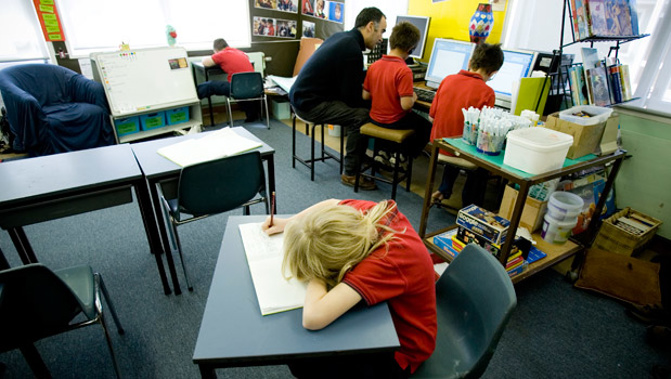
Children living in poverty in New Zealand are at least six times more likely to struggle with maths than students from wealthy backgrounds, a new report has found.
The ranking was one of the worst in the developed world, with only Ireland, Israel and Poland doing worse.
The report from the OECD, "Low-Performing Students: Why they fall behind and how to help them succeed" found students from the poorest 25 per cent of households in New Zealand were more than six times more to be low performers in maths compared to those in the top 25 percent.
Our figures was five times that of Australia.
Based on the 2012 results from PISA tests, sat by 15-year-olds around the world, the report also found that lack of early childhood education or coming from a solo parent family worsened the effects of deprivation.
Previous reporting on the data found that children’s socio-economic background accounted for 18 percent of the difference in results. However that did not include other factors such as an immigrant background or whether a child had two parents at home.
The report said socio-economic status was “probably” the most important risk factor associated with low academic performance, particularly if combined with other factors.
"Among low performers the combination of risk factors is more detrimental to disadvantaged than to advantaged students,” the report read.
"Indeed, all of the demographic characteristics considered in the report, as well as the lack of pre-primary education, increase the probability of low performance by a larger margin among disadvantaged than among advantaged students, on average across OECD countries."
It said one in four 15-year-old students in OECD countries had not attained a baseline level of proficiency in at least one of the three core subjects.
“In absolute numbers, this means that about 13 million 15-year-old students in the 64 countries and economies that participated in PISA 2012 were low performers in at least one subject; in some countries, more than one in two students were.”
The report noted, however, that while the link between socio-economic status and student achievement was strong, it should not be overstated.
“Many countries have managed to reduce the influence of socio-economic background on performance over time. In addition, some 6% of students across OECD countries are considered “resilient” in that, while they are disadvantaged, they manage to beat the odds against them and perform among the top quarter of students in PISA.”
The report said it was urgent for countries to address the issue.
“Poor performance at school has long-term consequences for both individuals and nations. Students who perform poorly at age 15 face a high risk of dropping out of school altogether; and when a large share of the population lacks basic skills, a country’s long-term economic growth is severely compromised,” it said.
WHAT DOES IT MEAN?
*Differences in student’s socio-economic, demographic and education background explain 15% of the variation in low performance across students, on average across OECD countries.
*On average across OECD countries, a student of average socio-economic status who is a boy living in a two-parent family, has no immigrant background, speaks the same language at home as in school, lives in a city, attended more than one year of pre-primary education, did not repeat a grade and attends a general curricular track (or school) has a 10% probability of low performance in mathematics, while a student with the same socio-economic status but who is a girl living in a single-parent family, has an immigrant background, speaks a different language at home than at school, lives in a rural area, did not attend pre-primary school, repeated a grade and attends a vocational track has a 76% probability of low performance.
*Other than socio-economic status, grade repetition is the single factor most strongly associated with low performance. After accounting for socio-economic background and other student characteristics, the odds of low performance in mathematics are 6.4 times greater for a student who has repeated a grade in primary or secondary school compared to a student who has not repeated a grade, on average across OECD countries.
By Kirsty Johnston for the NZ Herald
Take your Radio, Podcasts and Music with you









